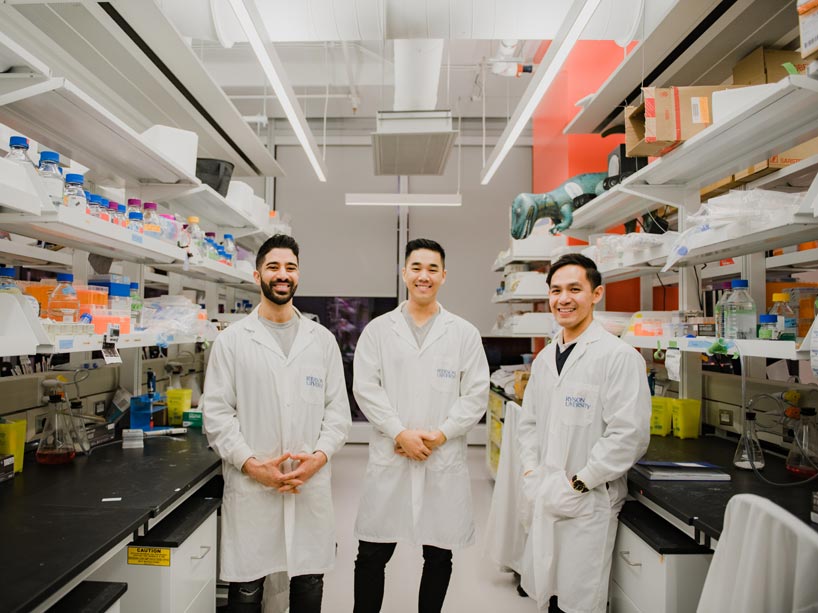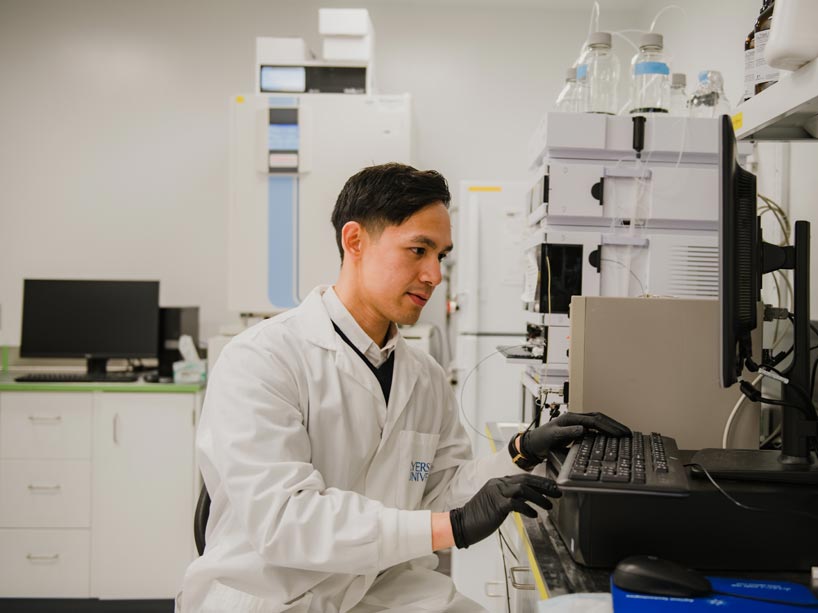Ryerson students plan to take cannabinoids to new heights

Biofect Innovations team from left: John Abousawan, PhD, molecular biology; Louis Lo, PhD candidate, molecular biology; and Christian Delos Santos, PhD, molecular biology, at the Ryerson lab in the MaRS building, hope to round the corner on their development phase. Photo credit: Alyssa Faoro.
Since legalization in 2018, the cannabis industry has exploded, meaning more demand and more strain on the environment. Not only does growing a large crop of plants require a ton of electricity and water (23 litres a day per plant to be exact), but a lot of land is needed for a relatively low yield.
Breaking into the industry is Biofect Innovations, a synthetic biology company founded in 2017 by five Ryerson PhD candidates and program graduates who starting to turn the corner on their product and hoping to disrupt the whole production process. They’re currently housed within Ryerson’s Science Discovery Zone and making full use of the resources on offer.
The hope is to use baker’s yeast to produce cannabis compounds including THC and CBD, as well as many other more rare and potentially therapeutic cannabinoids that have long been overlooked. Should they accomplish that, the team would do away with the need for the plant. To do this, they are modifying the yeast’s genes to make the individual chemicals needed to manufacture cannabinoids in the lab. When put together in the future, these genetic changes would allow the yeast to make desired cannabinoids to order.
The team formed back in 2017 when they were completing their PhD and master’s research. “One night, while drinking a beer together after working all day on our research, I thought to myself, ‘what is this all for?’” says Christian Delos Santos, PhD, molecular biology, co-founder and CEO. “We were learning to handle cells and manipulate genes, but I wondered: to what end? I wanted to leverage our expertise and apply it to something more tangible.”

Biofect Innovations CEO and co-founder Christian Delos Santos says Biofect has allowed the team to take their scientific knowledge into the business realm to advance cannabis research. Photo credit: Alyssa Faoro.
Delos Santos knew that he wanted to apply his knowledge to something beyond academia. The rest of the team felt the same. “We started looking at our collective expertise and said, ‘okay, we know how to engineer DNA, we know how to tweak it at a molecular level,” says Louis Lo, PhD candidate, molecular biology, co-founder and chief scientific officer. “And while drinking a beer together, we started asking ourselves why don’t we manipulate yeast?”
The success of this project could be paramount for the industry and have major economic pay-offs. “You need a lot of plants to extract the smallest amount of the compounds — but our process eliminates the plant and variables like humidity, temperature and energy that need to be considered when extracting from plants,” says Lo.
“Yeast can be engineered to produce only THC or CBD, or another compound altogether. Instead of having to extract it and separate it from hundreds of other compounds, you have this single source,” says Delos Santos. Currently, because it’s only economically sensible to harvest THC and CBD, hundreds of potentially therapeutic cannabinoids are being overlooked. “We have no idea what the benefits of the other cannabinoids are, so this could open the door to new research. The idea is that hopefully some of these compounds will lead to new and better medicines,” says Lo.
Similarly, their process can lighten the environmental load. Instead of hundreds of acres, the team says all they’ll need is a fermenting facility similar to what exists for beer. “It takes significantly less time to produce so it’s more efficient, it’s cheaper, and you can make a wider variety of compounds in greater volumes than the plant can, so by tweaking the pathway, you can scale up more significantly and relieve the environmental strain,” says John Abousawan, PhD, molecular biology, co-founder and chief business officer.
Delos Santos says they’ve now reached a critical stage in the development of their product and they’re nearing their ideal minimum viable product (MVP), a precursor chemical which ultimately sets the foundation for producing cannabis compounds. “Once we have that prerequisite, everything that came before can be replicated.” Abousawan says they’re currently working through their client discovery phase, with help from the Science Discovery Zone here at Ryerson. “The team there has connected us with a number of people including business connections, advisors and other networking opportunities. They’re also helping us develop our business plan and they’ve provided us with a lot of feedback. It is a valuable resource that we utilize quite often.”
The team has found the shift to be more organic than they expected. “For me, there are a lot of overlaps between being a scientist and being in business because scientific methods hold true here as well — you have a problem that you want to solve, and you take systematic approaches to solve that problem,” says Abousawan. “So leaping into business feels like a natural transition.”